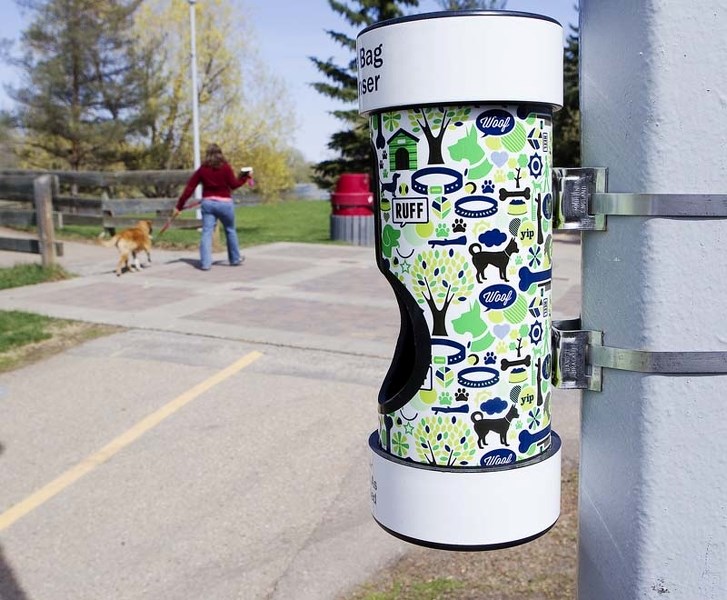Too young to work at a restaurant, Sage Wurtz ventured into a business few like to get their hands on.
The 13-year-old St. Albertan decided to be a pooper-scooper. That means he picks up the dog doo left on your neighbour’s lawn.
“I wanted extra money and I thought of a good way and I thought of that. I have my own dog so I do that a lot,” he said.
“I just thought it was a good idea.”
With temperatures rising above 20 degrees in the past weeks, the last snow has melted. That means six months’ worth of feces are defrosting on trails, and cooking in backyards.
In a dog-friendly city such as St. Albert it’s no wonder that Wurtz had his hands full already. In the three weeks since he started his business he cleaned about 10 yards.
His mom, Tabitha Wurtz, helps out by taking appointments and driving him around town. Equipped with gloves and a bag, Sage sweeps the grass while she makes sure the job gets done properly. Then the doo gets packed up and trucked off.
While the mother-son team still receives some awkward looks, Tabitha Wurtz said the business was a good idea.
“He’s been doing flyers for three years and it just doesn’t pay enough money so I thought it was a good idea. And it’s good money and teaching him responsibility,” she said.
The team offers a weekly service for $15 though Sage said he’s only done spring clean-ups for now. His customers pick what they pay.
“I made $130 before in one day. That’s the most I made,” he said.
A 20-year veteran in the business, Curtis Carter said there’s profit in poop but no passion.
The owner of Edmonton-based Canine Caddy first became a professional pooper-scooper to supplement his income. It pays the bills, he said, so he stuck with it.
Today, his company employs four full-time scoopers, paying them $20 to $25 an hour – as long as they bring their own truck. Weekly yard clean-ups cost $10.75, plus $3 per extra dog.
Carter said the scoopers work year-round no matter the weather.
“You have your pros and cons. In the summer it’s easy to pick it up, however then you deal with the nature of what you’re picking up such as the smell,” he said.
“Whereas in the winter it’s frozen, there is no smell. But then you are chipping it and you have to find it and you are dealing with the cold.”
This year was especially bad, he added. Due to the long winter, many people did not tend to their dog’s business and are now bombarding him with phone calls. In the past weeks, he had 300 one-time customers added to his regular 350 weekly jobs.
That’s a lot of work, he said, especially with small dogs where you barely see the pebble-like feces. Then there are also a few jobs like the one he turned down the other week.
“They weren’t little rocks, they were basketball sized boulders... It was layered and layered and layered and it was so thick,” he said.
“Really it was quite irresponsible of a dog owner to let their big dogs continuously defecate in an area that’s maybe 10 by three feet over a period of six months.”
Why clean it up?
Dealing with doodoo is a challenge, not just for those picking it up.
Leah Kongsrude, manager of community sustainability for the city of St. Albert, discovered E.coli bacteria in her last water quality tests of local storm water systems and the Sturgeon River. She suspects they came from feces in the water.
“We do have a lot of dogs here in St. Albert and unfortunately not everyone picks up after their dogs,” she said.
“In some cases if you have a yard and have a dog and you don’t clean it up on a regular basis, even rain falling on your yard can wash some of the E.coli on the street and it gets into the stormwater surge.”
E.coli bacteria can cause safety and health issues for people wading or swimming in the water. While there are also some ducks defecating in the water, Kongsrude said plant eaters don’t carry the same amount of bacteria.
“Yes, ducks poop in the water but they just eat the vegetation so it’s not as bad. It’s us carnivores that give poop a bad reputation,” she laughed.
It’s not just E.coli bacteria that are transmitted through feces.
Norman Neumann, associate professor at the University of Alberta’s School of Public Health has a list of worms ready for anyone who asks, most of them visible to the eye once excreted.
While most puppies are treated against tapeworms and roundworms, he said dogs can still pick up an organism from the feces of other dogs, or when biting small rodents.
“If you come in contact with your dog’s feces after it’s become infected then you can become infected like the rodent,” he said, adding that rarely happens though.
More common are risks of contracting salmonella bacteria after feeding dogs raw, unprocessed meats, such as chicken. Children are more apt to pick up infectious diseases, he said, as they touch their faces more often.
He added that flies can cause problems if dog doo is left lying around.
“As soon as the dog goes to the bathroom the first thing that’s on (the feces) are flies. But those same flies can go and land on your salad,” Neumann said.
Pooper-scoopers such as Carter and Wurtz can help clean up yards on a regular basis but Kongsrude and Neumann said people should also watch their dogs running free in parks and ravines.
Those are areas apt to having high bacteria levels as feces are often left unattended.




